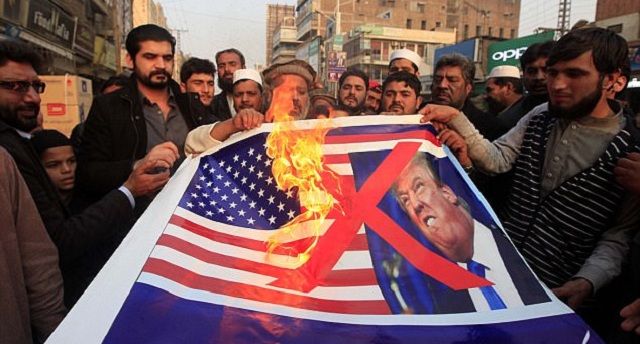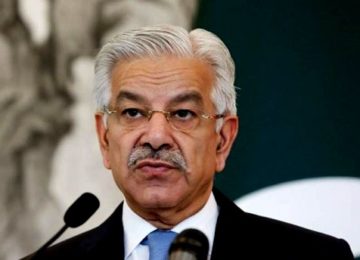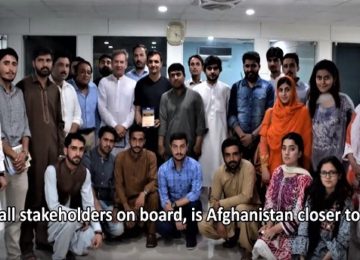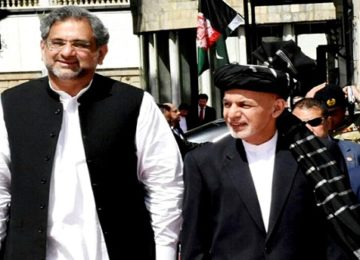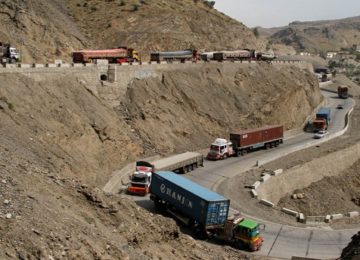President Donald Trump’s recent aggressive tweeting spree against Pakistan was anything but impulsive behaviour.
His National Security Advisor General HR McMaster went a step further, saying Pakistan would become North Korea if it does not stop nuclear blackmail.
Given its failure of diplomacy with the Asian nation, the Trump administration official was expressing Washington’s worst fear, rather than threatening a “complex” ally. US permanent representative to the UN, Nikki Nimrata Haley Randhawa was more specific in stating that Pakistan’s $225million would be withheld. “Pakistan has played a double game for years,” she said.
Washington is mulling over suspension of $1 billion in planned military assistance, including the $255 million in foreign military financing put on hold in August, and an additional $900 million in Coalition Support Funds.
On Tuesday, Pakistan’s defence minister Khurram Dastagir Khan announced an end to military and intelligence cooperation with the US. He said it was high time for Islamabad to start “ruthlessly candid dialogue” on a wide range of issues.
“At the same time, strategic dialogue between the two countries has also faced suspension for last two years. High level talks with US would not work until resumption and consistency in working level negotiations,” he explained.
Islamabad has been preparing for such a moment since the Obama presidency. The reply to Trump’s public outrage is “no more”. The elected government, the military and the people seem to share this stance.
Indeed, the Trump administration has added Pakistan to a special watchlist for violations of religious freedom. Islamabad has rejected the “discriminatory” listing while seeking an explanation.
Over the past 16 years, it has been unclear if the US wants Afghanistan to return to normalcy, or station troops there without actually addressing the country’s core issues.
Trump wants results in Afghanistan, but he is neither willing to visit the country, nor take a hard look at the reality on the ground.
It was hoped General McMaster might bring some sanity into the administration’s security policies, but he has rather preferred the role of a conformist.
Pakistan’s response to public humiliation won’t come in kind, because its options are not constrained by America’s snub. It has granted the US assistance in the past, including free use of airspace and logistical routes to Afghanistan, the provision of military bases and intelligence sharing, and extensive operations resulting in the arrest and handover of top al-Qaeda commanders such as Khaled Shaikh Mohammad.
If the logistical access to Afghanistan is barred, the US will not be able to reach Kabul and Kandahar via Iran. The only option would be to ship the supplies for troops through Russia and Central Asian states in the north.
Though Trump seems fond of Putin, military passage will be unlikely until Washington lifts the Crimea-related sanctions against Moscow. When the US briefly used the northern route during the Obama era, relations with Russia were not warm but there were no punitive measures in place either.
Possibly, Trump may like to use Pakistan’s refusal for access as an excuse to normalise relations with Putin’s Russia; a deep-rooted desire.
Even if Islamabad agrees, the use of its airspace and land route to Afghanistan won’t come for free. But in comparison to the political and financial cost of using the northern route, it will still come for peanuts.
While US relations with Turkey have been increasingly tense, and Iran has been behaving increasingly provocatively in the region, hurting ties with Pakistan does not augur well for the US, which has thousands of troops, and its reputation at stake in Afghanistan.
Which of Afghanistan’s neighbours has been acting favourably towards the US? The answer is none, albeit Pakistan with some policy or tactical differences.
Rocking relations, historically marred by highs and lows, is also extremely consequential for Iran, which has recently been trying to appease Pakistan after providing a land route to arch rival India through Chabahar port.
As he moves to block the nuclear deal, Trump’s rash move against Pakistan also contradicts his policy towards Iran. That said, Pakistanis have traditionally seen Iran as a disruptive nation, aiming to export its revolution through its proxies and militias, and growing anti-US sentiment in Islamabad has been greatly exploited by Tehran.
To increase America’s cost of war in Afghanistan, the clerical regime that earlier provided sanctuaries to Afghan warlords and Osama bin Laden now aids the Taliban for no different goal.
India has long relied on its contacts within the Taliban to launch clandestine operations inside Pakistan, especially in the Balochistan province that borders Afghanistan, and that houses an Arabian sea port operated by China.
Washington accuses Pakistan of a selective approach towards the Haqqani network, while Islamabad claims it has not only gone after all groups but is also spending millions of dollars to fence the 2,400km long treacherous Afghan border.
The fencing may not be complete until 2019. Compared to Pakistan’s 200,000 troops deployed on the border, Afghan and US troops run into a few thousand.
One Wired report discussed involvement of Afghan armed forces in the country’s high value and illicit export drugs trade. If Pakistan is to be blamed for Afghanistan’s internal security woes, then who is responsible for bumper poppy crops year by year? Where’s the writ of the government and support of its allies such as the US?
By default, China gets to fill the vacuum created by the US vis-a-vis Pakistan, as well as the peace process in Afghanistan. Unconfirmed reports indicate that Islamabad has provided Beijing land for a military base in the coastal town of Jiwani along the Iranian border. Not only would the base deter the designs of India – America’s ally – but would also have implications for US military presence in the Gulf.
The more Pakistan is pressed to cede space to India in Afghanistan, the more consequential its ties with China will be for America.
Compared to the US’ total direct investment in Pakistan of $42 million in 2017, China’s stretches to $837 million. Moreover, there’s a rare warmth between Islamabad-Moscow relations. Pakistan is a using Russian turbojet jet engine for the fighter jet designed and manufactured with Chinese collaboration.
Such have been the fruits of a rash era of sanctions starting with Pressler Amendment in 1990. How convenient for Russia to have a crescent of Muslim countries all the way from Turkey to Pakistan falling in line against the US! Given such adverse, only Trump, McMaster and Nikki Haley may find a way to success in Afghanistan.
In the best case scenario that sees sanity prevail in Washington, the US retains significant clout in Pakistan. Thanks to its enormous Fulbright scholarship programme and countless other fellowships and specialised training programmes for government, the ties could be mended through astute diplomacy.
Pakistan is not Iran. The anti-US sentiment stems from the public humiliation through repeated statements that are read as parroting of Indian rhetoric. The US is home to a vibrant and affluent Pakistani community, always acting as a bridge between two countries which have more to share than to dispute.
It might be a lesser-known fact that Pakistan is the third largest exporter of physicians to the US medical sector. The pickle here is that Trump has not visited Pakistan or Afghanistan. Obama did make a surprise visit to Kabul but skipped Islamabad.
Donald Trump has not shocked the average Pakistani. As mentioned earlier, the military has been ready for the US refusal to sell arms or provide assistance for about a decade.
The goodwill America has earned through people-to-people contacts or knowledge and skills development programmes is enough to reset the relationship for a positive start, without aid but with focus on trade.
The author Naveed Ahmad is a Doha-based investigative journalist and academic with special focus on diplomacy, security and energy issues.
Original Source: The New Arab.
Disclaimer: Views expressed on this blog are not necessarily endorsed or supported by the Center for Research and Security Studies, Islamabad.



